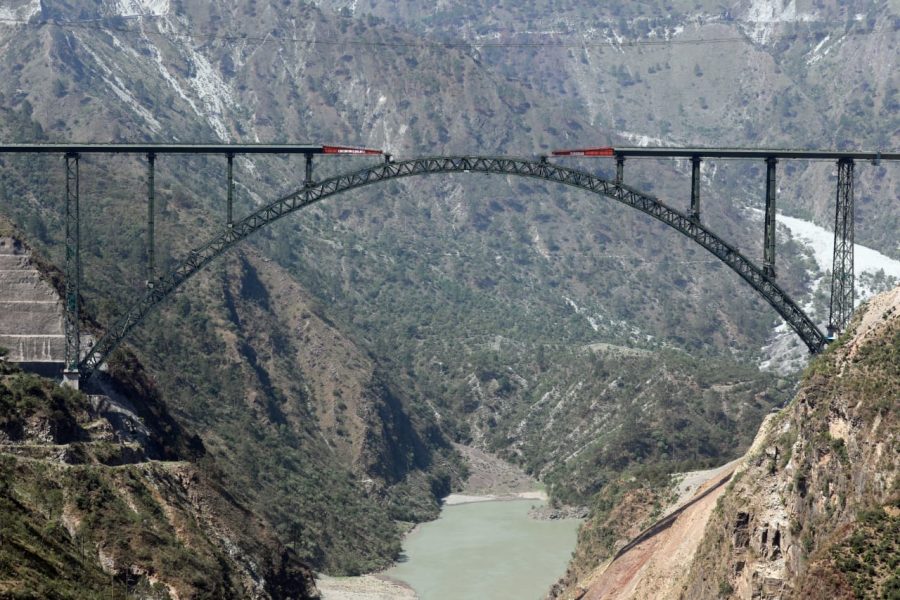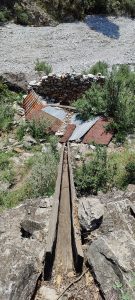
World's highest railway bridge will leave J&K villages high and dry

In June this year, the Ministry of Railways hopped on social media to claim that 88 per cent work on the world’s highest railway bridge (35 m taller than Paris’ Eiffel Tower) over River Chenab in Jammu and Kashmir’s Reasi district is completed as a part of ambitious Udhampur-Srinagar-Baramulla Railway Link (USBRL) Project and soon all-weather rail connectivity to Kashmir shall be started.
But very little was talked about the repercussions of this project.
“Connecting India: Almost there! With 88% completion of deck launching, Chenab Bridge will soon bring all-weather rail connectivity to Kashmir,” the ministry of railway wrote on Twitter on June 23, 2022.
USBRL, a 272-km-long mammoth engineering project with 38 tunnels (119-km length) and 927 bridges (13-km length) between Udhampur and Baramulla districts, has apparently created a water crisis in several villages en route Baramulla.
Also read: In pix: World’s highest railway bridge over Chenab nearing completion
In Jammu region’s Reasi district’s Bhomag Block, a 6-km-long railway tunnel constructed in 2015 has dried up a gushing water stream that used to provide water to five villages — Ser Meghan, Sarhanapura, Bakkal, Ser Sondhwan, and Bladda.
Natural flow diverted
“Until 2015, water would flow to our villages from a local Nag Devta (snake god) Devsthan-based water source in three pipes through gravitational pull. But, a 6-km long railway tunnel between Gram Morh, Reasi and Bakkal village got the natural flow of water diverted towards Gram Morh, Reasi; thus, a major water crisis occurred in our village,” said Amarnath, sarpanch (village head) of Ser Sondhwan panchayat.
He said when the worried villagers approached the district and divisional administration and Railway authorities for their intervention, the Railways initially agreed to provide 2-3 water tankers per day to affected villages. This continued for around two-and-a-half years. Later, two borewells were installed in Ser Meghan and one in Ser Sondhwan village.
“Borewells were also installed in other affected villages,” claimed the Ser Sondhwan village head, adding, “but now, almost four-and-a-half-year after the installation of borewells, the groundwater in our areas has started depleting.”
Dhani Ram, 62, a retired headmaster, said, “The groundwater has depleted to the extent of 45-50 per cent. Under such circumstances, our people hardly get 2-3 gallons of water every 4th or 5th day,” he said.
District Development Council Chairman, Reasi, Saraf Singh Nag, the former Kashmir Administrative Services (KAS) officer, who voluntarily retired from services to join active politics in 2014, also accepted that the groundwater in Bhomag block has started depleting — up to 60 per cent in some villages.
He said, “Bhomag is a hilly block. Here water could be traced by digging several hundred feet into the ground. And if this water is continuously used, there is a possibility of groundwater depletion”.
According to Nag, there are 13 underground tunnels constructed by railways between Katra town and Sawalakot village in Reasi district.
Due to blasting and other underground activities carried out by the Railways to construct these tunnels, he said, “Over a dozen villages are now facing water shortage as almost all the conventional groundwater sources have either dried up or become polluted due to seepage of chemicals from the tubes”.
He added, “Now, 90 per cent of the villages are being provided water using lift irrigation projects while the rest of the population is provided water using gravitational sources. But to function properly, the lift irrigation projects need power supply. However, in Reasi’s hilly areas, electricity has always remained a casualty, thus the expected water shortage.”
Traditional flour mills shut due to water scarcity

Prior to the construction of the tunnel between Gram Morh, Reasi and Bakkal, there operated many traditional water flour mills, locally called as gharaat, in all the five affected villages. But seven years down the line, almost all the owners of the flour mills have shut their businesses due to water shortage. While some of the affected flour mills’ owners have started labour works, others are leading a miserable life, sans work opportunities.
As per Ser Meghan numberdaar Ramesh Chander, three traditional flour mills have shut in his village. “In other villages as well,” Ramesh said, “people have closed their flour mills due to non-availability of water.”
Water shortage triggers migration
According to Ramesh, the water scarcity in Bhomag block has also forced five families to migrate to Reasi and Jammu towns, respectively.
“It’s been seven years since the lone natural water source in our village dried up due to the construction of a railway tunnel. Since then, we have been meeting Jal Shakti department officials, DCs, Divisional Commissioners, elected representatives, including MLAs, MPs and ministers. But our problem remains the same till today,” the disappointed numberdaar said.
“Upset over the continuous administrative apathy, around five families from our village have migrated to Reasi and Jammu towns,” he added
Ramesh also feared that in case the government fails to provide a permanent solution to their problem, people would migrate en masse to other towns.
“Kashmiri Pandits migrated due to terrorism during the 90s. But, in our case, the reason for migration would be shortage of water,” he said, adding, “and it would be a major embarrassment for the government.”
Union railway minister also apprised of grievances
On September 13, 2021, Union Railway Minister Ashwini Vaishnav visited Reasi town where he was informed about the depletion of water sources.
As per Ser Sondhwan residents, Vaishnav told the visiting delegations that very soon the WAPCOS team, formerly known as Water and Power Consultancy Services Limited, would visit affected villages for a detailed scientific study.
“The minister had also assured that necessary measures would be taken accordingly. But the WAPCOS team, which visited only Bakkal village on the minister’s direction later, concluded in its report that the problem existed only there (in Bakkal) and not in other villages,” Ser Sondhwan villagers said.
Bakkal, they said, “is a small village” that hardly has 500 people whereas Ser Sondhwan panchayat has a population of over 4,000 people. “But surprisingly, a water supply scheme was announced for Bakkal and not for Ser Sondhwan panchayat or other affected villages,” villagers regretted.
Government acknowledges problem
Reasi’s Jal Shakti Department Executive Engineer Fateh Mohammad Choudhary acknowledged the problem of depletion of groundwater in Bhomag villages.
“While I have joined in April this year, I have been told by my predecessors as well that water shortage and depletion problems exist there in some villages of Bhomag block due to construction of the railway projects,” Choudhary told The Federal.
He added: “I have even heard people of Bhomag block complaining about water shortage-related issues in some of the district level meetings I’ve attended recently. In a recent meeting, I have been directed by DC Reasi to look into this issue on priority basis and very soon, I along with my team would visit the spot and see whether the existing water source in that area could be recharged”.
“If that wouldn’t be a possibility, we will provide water to the affected villages from Bakkal, where a water supply scheme has already been sanctioned and running smoothly,” he added.
Also read: Chennai’s MRTS rules out development of Buckingham Canal as National Waterway: Centre
While deputy commissioner Reasi, Babila Rakwal, didn’t reply to the phone calls, tehsildar Bhomag, Suresh Singh, said, “We are looking into this issue on priority and seeing whether water could be provided to the affected villages from other villages under JJM (Jal Jeevan Mission) schemes.”
Northern Railways is expected to complete the ambitious USBRL Project by December 2022.


